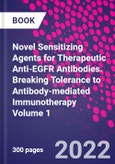Novel Sensitizing Agents for Therapeutic Anti-EGFR Antibodies presents a description of the sensitizers used to overcome resistance to anti-EGFR targeted antibody therapies in cancer, including novel engineered antibody drugs and other sensitizers. The book gives insights into the landscape of anti-EGFR based cancer treatments, the challenges of targeted therapy, and a glimpse into the future of antibody therapy. It offers pertinent science information on strategies used for the rational design and discovery of novel sensitizing agents, and in addition, translational studies involving pre-clinical and clinical design. This book is an indispensable resource for cancer researchers, medicinal chemists and other biomedical scientists.
Finally, the book covers basic science strategies used in drug discovery and preclinical evaluation focused on EGFR blockage resistance, as well as clinical trial methodology, including clinical pharmacokinetics and imaging to address issues of efficacy evaluation of the new anticancer sensitizers for anti-EGFR drug resistance.
Please Note: This is an On Demand product, delivery may take up to 11 working days after payment has been received.
Table of Contents
1. Introduction: Overview of anti-EGFR antibody therapy in cancer2. Molecular Mechanisms of Resistance to therapeutic antibodies to the Epidermal Growth Factor Receptor
Part I: 1?ERBB inhibitors as sensitizers for anti-EGFR antibodies3. MM-151 overcomes acquired resistance to cetuximab and panitumumab in colorectal cancers harboring EGFR extracellular domain mutations4. Sym004 Anti-EGFR Antibody Mixture overcomes resistance to anti-EGFR antibodies in Metastatic Colorectal Cancer5. HER3 Targeting with MM-121 Sensitizes HNSCC to Cetuximab by Reducing HER3 Activity and HER2/HER3 Dimerization6. Pan-HER, an Antibody Mixture Simultaneously Targeting EGFR, HER2, and HER3, Effectively Overcomes resistance to anti-EGFR antibodies.7. Pan-HER targeting with Four-in-one antibodies disrupting the HER/MET crosstalk8. Overcoming acquired resistance to cetuximab by combined EGFR and HER3 neutralizing monoclonal antibodies9. Dual targeting of EGFR and HER3 with MEHD7945A overcomes acquired resistance to EGFR inhibitors10. Inhibition of ERBB2 signaling overcome resistance to the EGFR-directed therapeutic antibody cetuximab11. Dual inhibition of EGFR with afatinib and cetuximab in kinase inhibitor-resistant EGFR models
Part II: Alternative receptor tyrosine kinase inhibitors as sensitizers for anti-EGFR antibodies12. BET Inhibition Overcomes Receptor Tyrosine Kinase-Mediated Cetuximab Resistance in HNSCC13. Dual Inhibition of EGFR and c-Src by Cetuximab and Dasatinib Combined with FOLFOX Chemotherapy in Patients with Metastatic Colorectal Cancer14. A Novel Bispecific Antibody Targeting EGFR and cMet Is Effective against EGFR Inhibitor-Resistant Lung Tumors15. Use MET kinase inhibitor to overcome cetuximab resistance in CRC16. EGFR- and VEGF(R)-targeted small molecules show synergistic activity in colorectal cancer models refractory to combinations of monoclonal antibodies17. Antitumor activity of ZD6474, a vascular endothelial growth factor receptor tyrosine kinase inhibitor, in human cancer cells with acquired resistance to anti epidermal growth factor receptor therapy
Part III: Downstream kinase inhibitors as sensitizers for anti-EGFR antibodies18. Antibody-mediated delivery of anti-KRAS-siRNA in vivo overcomes therapy resistance in colon cancer19. Primary and acquired resistance of colorectal cancer cells to anti-EGFR antibodies converge on MEK/ERK pathway activation and can be overcome by combined MEK/EGFR inhibition20. MEK1/2 inhibitors may be potential therapies for colorectal cancer that is resistant to EGFR monoclonal antibody therapy21. EGFR/JIP-4/JNK2 signaling attenuates cetuximab-mediated radiosensitization of squamous cell carcinoma cells22. Efficient blockade of Akt signaling is a determinant factor to overcome resistance to matuzumab.
Part IV: Other sensitizers for anti-EGFR antibodies23. Inhibition of SLC1A5 sensitizes colorectal cancer to cetuximab24. Targeting of PYK2 Synergizes with EGFR Antagonists in Basal-like TNBC and Circumvents HER3-Associated Resistance via the NEDD4-NDRG1 Axis25. Targeting EGFR/Notch to overcome resistance to anti-EGFR antibodies26. Hedgehog signaling alters reliance on EGF receptor signaling and mediates anti-EGFR therapeutic resistance in head and neck cancer27. Novel toll-like receptor 9 agonist induces epidermal growth factor receptor (EGFR) inhibition and synergistic antitumor activity with EGFR inhibitors28. Rationale for combination of therapeutic antibodies targeting tumor cells and immune checkpoint receptors








